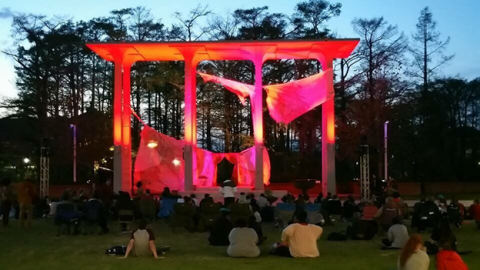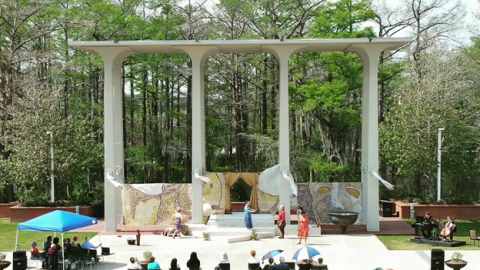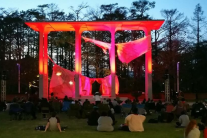Risky outdoor performance of "Electra" pays off for performing arts
Wed, 04/04/2018 - 9:50amReprinted from the Vermilion: Mar 27, 2018 Updated Mar 28, 2018

The University of Louisiana at Lafayette Performing Arts program hosted its spring production, "Electra," a classic Greek tragedy, in front of Cypress Lake in the Student Union courtyard.
Last Sunday, March 25, the University of Louisiana at Lafayette Performing Arts program wrapped up its two-week run of “Electra,” and to have seen it is to have seen a spectacular, ambitious homage to the roots of tragic theatre and a strikingly contemporary iteration of 2,000-year-old story.
The production was staged outdoors — mirroring the staging of ancient Greek plays — in the Student Union Courtyard against the backdrop of Cypress Lake and underneath the moon-reaching pillars that stand like curving white teeth at the mouth of swamp.
The logistics of performing outdoors entails challenges not just to production crew who have to negotiate the unpredictability of natural elements, but also for performers, and the success of “Electra” is greatly due to the actors’ success in adapting themselves to this new environment.
“Feelings have to be bigger, you know,” said Director Carl Granieri (“Metamorphoses,” “The North Plan”), telling me of the challenges. “You have to read at a greater distance, and (the actors) are competing with Cypress Lake and the sky and all the ambient noise.”
He was speaking to me after a grueling four-hour rehearsal — something which the cast and crew did most days of the week, from 6 p.m. until sometimes later than 10 p.m. — but despite this, he spoke with the intense, animated energy that is his calling card.
My first viewing of “Electra” wasn’t until the first week’s Sunday matinee, after Saturday’s evening’s show cancellation (weather concerns were the alleged cause, amid rumors of a derailing drama within the cast).
I’ve always held that one can best tell the mettle of a performing group by their matinee performance — the audience has a strange energy (or lack thereof) and the mystery of night no longer cloaks the event. Daylight, for me, always seemed to cheapen events like this, but that is most likely a conditioning born from Prime Time television and afternoon rec-league soccer games. It brings to mind Jim Gaffigan’s joke about eating ice cream during the day: “What are we, six?”
Even outdoors under a glaring 2 p.m. sun, against a small, sweating audience that dotted the green of the Courtyard, the performance was a delight. The sun and clouds became de facto production crew, giving a strange, unscripted emphasis to moments when the sun became hidden, and a shadow would be thrown over the locale, or when the light would break through again.
To stage-left, a cellist and a percussionist, dressed in black and seated on a small black dais, provided eerie ambience.
There were stumbles in line delivery, and sometimes a palpable ebb in energy, but this was more or less expected: it was the end of the week, and the heat was shimmering.
The sound of emergency-vehicle sirens bled faintly over the university grounds — a reminder of our place in time: two millennia after the story of Electra, but still entrenched in a social structure that limits women’s roles.
Both Electra (Brandii Champagne) and her murderous mother, Clytemnestra (played with a contained, cold fury by Sara Birk) are complex characters that are pitted against each other and the political and social ideas of where women fit into those structures.
As an assistant stage manager said in an announcement preceding the performance, the show in daylight is vastly different from the nocturnal experience.

The turnout for the final evening performance, on Saturday, March 24, was substantially larger than the matinee, and there was an air of festivity floating through the purple twilight. The event began just after sundown, and the cellist’s strains, punctuated by clicks and clacks and a soft bongo, threaded through couples and families seated on folding-chairs and blankets as they watched Orestes (Tanner Cole) and his loyal servant (Duncan Thistlewaite) approach, at a half-run, the pillars of his home.
Under the night sky, the performance shined; highlights included Electra’s haunting entrance with her face obscured by a gruesome mask, the beautiful blocking and framing of the Chorus (Kaitlin Romero, Lacy Howard, Lexi Louviere) and the elaborate story spun by Orestes’ servant, detailing his master’s fake death (Thistlewaite rendered wonderfully the subtle hilarity in the servant getting carried away in his own story constructing the scenario of Orestes’ grisly demise).
The stage design had undergone a transformation for the last string of performance dates, with the set changing from artfully draped and painted fabric (a reflection, perhaps, of the sails of Agamemnon’s ships) to a white-and-gold stone-patterned wall, with proper doors beneath a geometric arch. This evolution from ethereal to substantial mirrored something else onstage, an apparent solidification of the cast’s performance that, with the aid of spectacular lighting and sound design, made for a spellbinding argument for the relevance of ancient theatre and modern interpretation. The cypress trees of the lake, lit from underneath by a golden glow, stood towering over the stage and, visible through the gates, served as an inescapable reminder of the nature’s place in the play’s fabric and the positioning of human tragedy in a cold and wild world.
The expansiveness of “Electra’s” outdoor setting allowed for creative extension to the set, with at one point a spotlight being turned on to a giant charmingly abstracted puppet-ghost of Agamemnon, who waved eerily from atop the roof of the Union.
“All the world’s a stage,” said the melancholy Jaques in “As You Like It,” and this production was a standing proof of that. From the wailing sirens during Sunday’s matinee to the the 9 p.m. bells tolling from a nearby church that seemed impeccably timed, to the gusting wind and the magnificent entrance of Aegisthus (Matt Heyer) from behind the audience, performance and reality blended together into a complementary whole.
Costume design by Kendra Weeks brought a flair of contemporary couture to ancient Greece, most splendidly in the scarlet jumpsuit worn by Chrysothemis’ (Emily Daigle): a chic, cosmopolitan affair that complemented the structure of the character while suggesting something more Manhattan than Mycenae.
The insertion of suggestions, or echoes, of modernity in the production further contributed to the immersive qualities of the performance and the audience effectively became, for two hours, passive citizens of Mycenae in the courtyard of the palace watching the drama of the house of Agamemnon unfold.
The UL Lafayette Performing Arts program is doing great things, and the risk it took with “Electra” paid off.

